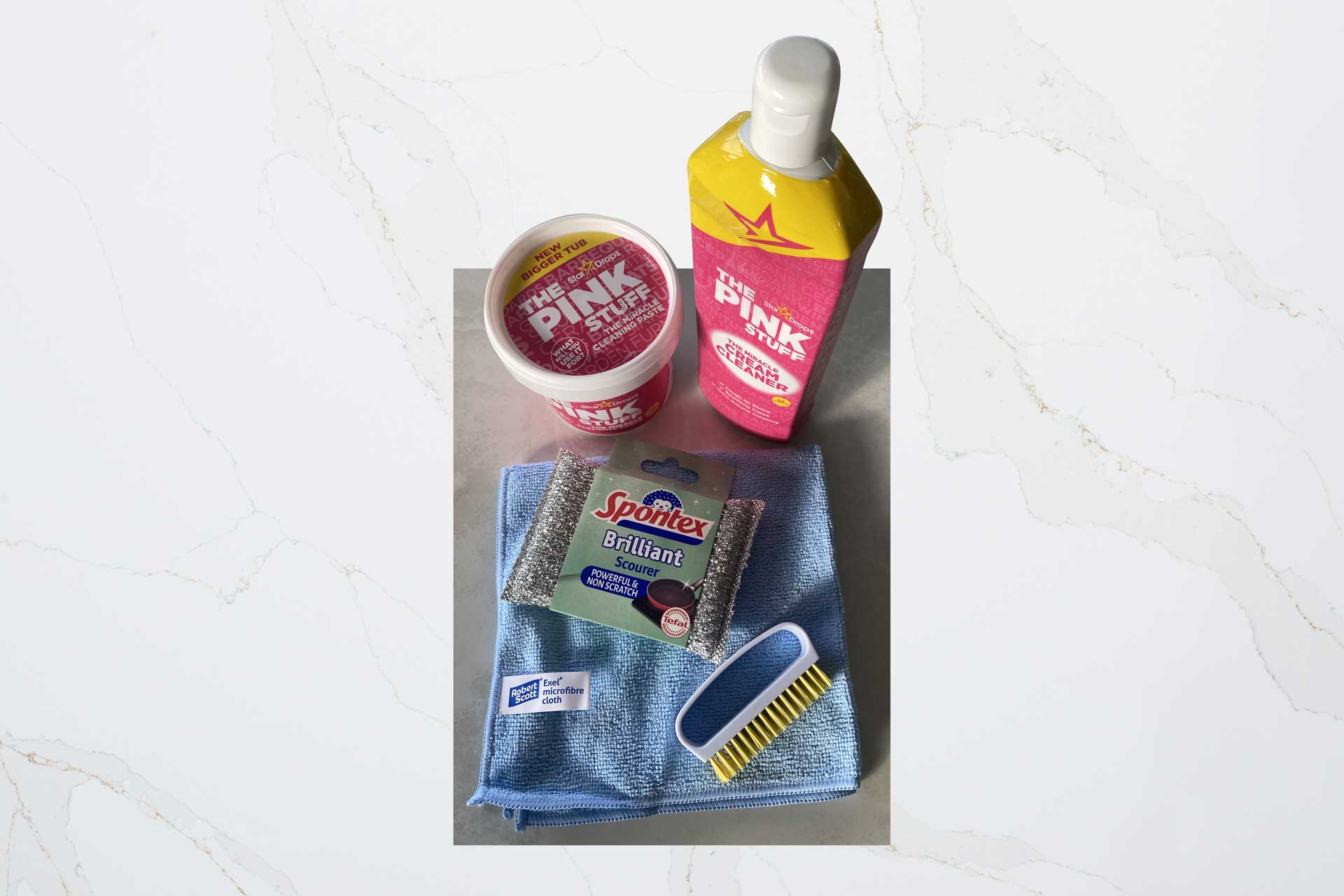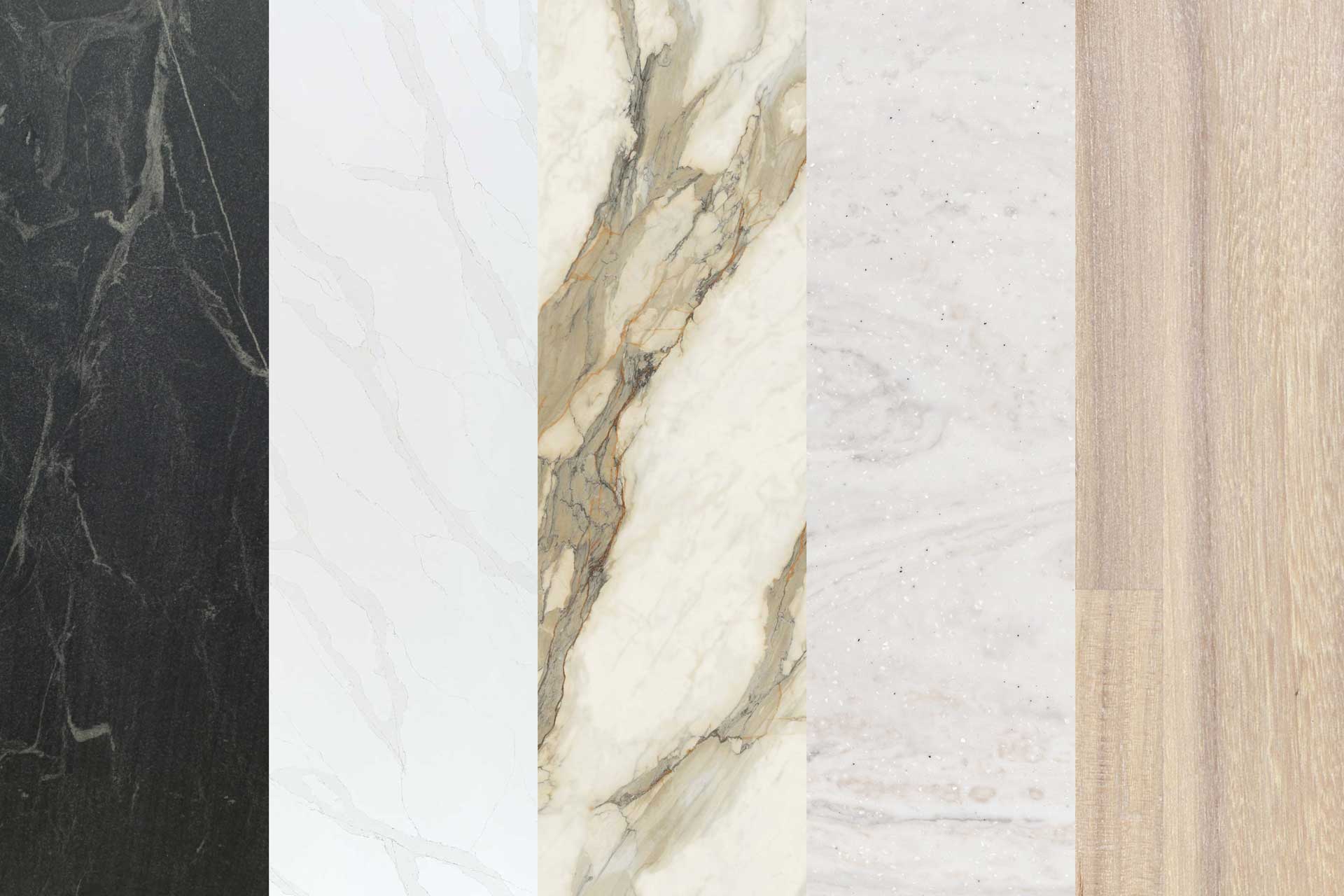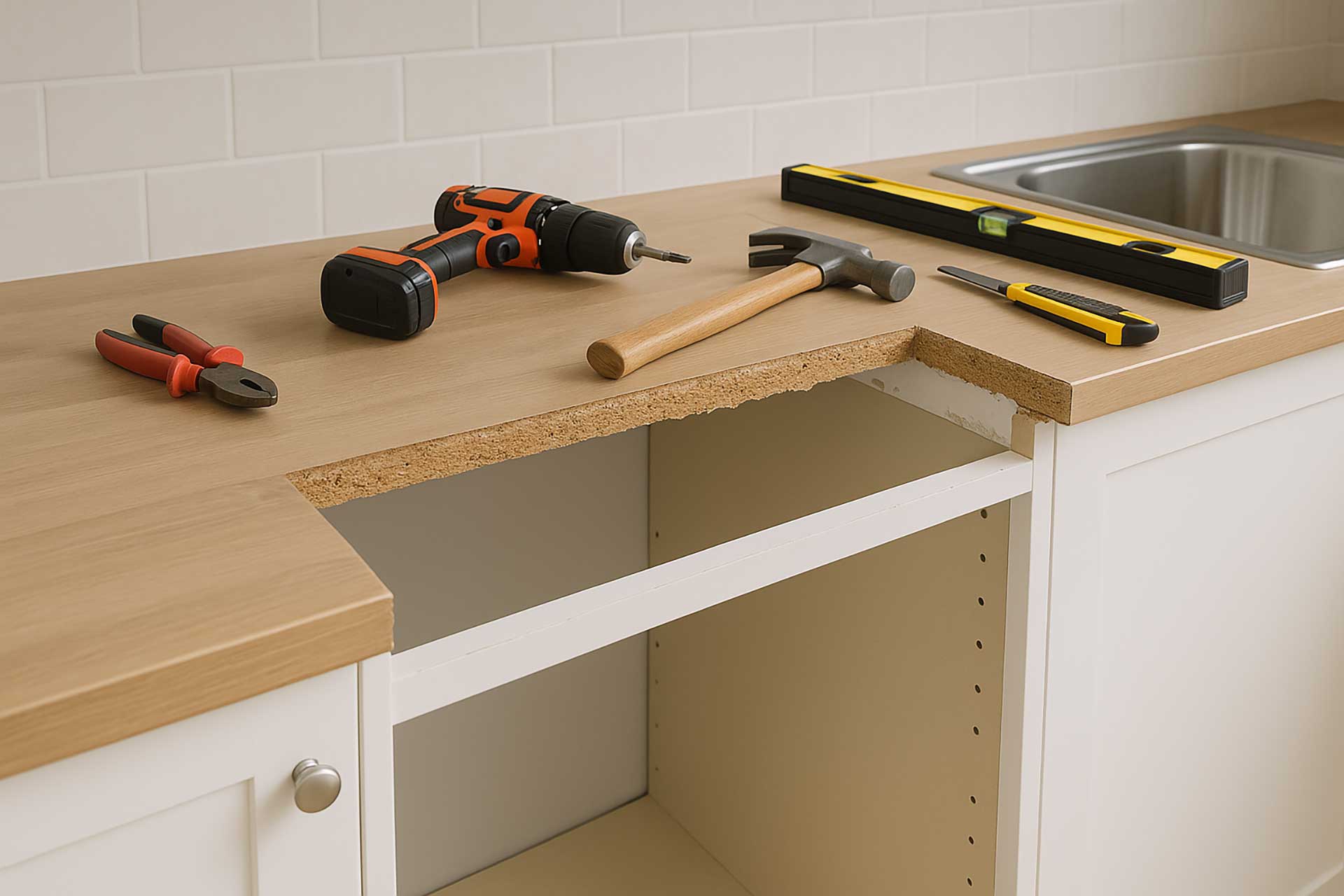
How to clean kitchen worktops
Normal Maintenance
Due to its practically zero porosity, ultra-compact surfaces are highly resistant to staining in day-to-day use making it ideal for use as a kitchen worktop and as a surface for other kinds of work, both inside and out.
If there is a stain, we recommend the use of The Pink Stuff Cream Cleaner or Cleaning Paste.
- Apply cream on to a damp soft cloth or sponge
- Wipe over and rinse with clean water
- Buff with a clean microfibre cloth
Cleaning Stubborn Stains
In the case of stubborn stains, after applying The Pink Stuff, try using a nail brush and if that fails gently increase pressure with a non-scratch Scourer. Try and test on an inconspicuous area of the surface to be cleaned before use.
Prevention of knocks and marking
Although Ultra Compact surfaces are extremely resistant, knocks should be avoided in areas which are more exposed, such as corners, edges and bevels etc.
Avoid the use of metal sponges or abrasive particles and avoid direct cutting on the surface with a ceramic knife, as they are a material with similar hardness to the worktop.
All worktops need careful care and maintenance to keep them in good order.
It also depends on the colour and surface finish as to how much time you spend cleaning your worktops.
‘Polished’ worktops are easier to clean than ‘Natural’ Finishes as any spillages wipe away more easily.
The best recommendation is to clean up any spillages at the time and not let them sit on the worktop for any amount of time.
If you are using a household cleaner or our recommended brand then always rinse and dry with a clean tea towel.
Key reasons to clean kitchen countertops
- remove visible dirt;
- for health reasons, keep them free of germs;
- proper care and cleaning will help you enjoy the luxurious look of kitchen worktops for generations;
- it is more pleasant to work and socialise in a clean and orderly kitchen.
If you need more information or would like to request a quote for a new kitchen worktop, please call 0330 088 3391 or use our contact form to get in touch.
Different kitchen worktop materials require different cleaning methods
Taking preventive care and wiping down your kitchen worktops will go a long way towards making your kitchen look shiny and clean, but with the vast number of different worktop materials available, it might be tricky to know what is the best way of cleaning each type of surface.
Simple preventive measures to keep worktops clean and hygienic
Before we look at the best way to clean the most popular kitchen worktop surfaces, let us consider some common-sense preventive measures that will help keep countertops clean and protect them against damage and stains.
- Use hot pads or trivets to protect kitchen worktops from heat.
- Use chopping blocks or cutting boards to prevent scratches and knocks.
- Avoid excessive exposure to abrasive or staining liquids.
- Use soft non-abrasive cloths to wipe the worktop surfaces.
- Specially formulated cleaners can be bought, but in most cases, you will be able to clean the different types of worktops with a mild household soap or dishwashing liquid.
- Do not use paint removers, oven cleaners or strong chemicals to clean the worktops.
- Avoid using sugar soap on worktops with sealers or varnish. It works well to remove stubborn grease, but you risk damaging the sealants or varnish and if it is left on for too long might damage some of the other surfaces as well.
- Avoid using vinegar on limestone and marble worktops, as the acid may react with the minerals in the stone.
- Immediately wipe up any liquid spills that can stain the surface, before they can be absorbed
- Wipe up water spills to prevent limescale or watermarks that can dull the surface.
- Regularly wipe the kitchen worktop with a food-safe sanitiser.
Our guide to cleaning kitchen worktop surfaces
How to clean Solid Surface kitchen worktops
- For daily care, simply wipe the worktops with a soft, damp, microfibre cloth and then wipe it dry.
- To remove dirt, wash the surface with a sponge or soft cloth, using specially formulated cleaner, dishwashing liquid, or household soap diluted in warm water. For stubborn grime, leave the soap solution on for a few minutes and then wash it off.
- Avoid window cleaners or any other cleaner that leaves a waxy residue, or strong cleaners which will ultimately dull the surface.
- For difficult areas, a mildly abrasive liquid cleaner can be used, but rinse this off thoroughly and wipe it dry immediately.
- You can remove limescale and watermarks by using a soft paste of bicarbonate of soda. Rinse it off thoroughly and immediately dry the surface with a soft cloth. Take care with shiny surfaces to ensure the paste does not dull the surface.
How to remove stains from Solid Surface kitchen worktops
Solid Surface worktops are highly resistant to stains because the high-density non-porous material does not absorb liquids. However, sooner or later you may spill wine or some other substance that leaves a surface stain if not cleaned immediately. Here are some easy methods to remove surface stains.
- Apply lemon juice or vinegar on the stain with a spray bottle and leave for a few minutes. Then rinse thoroughly with clean water and dry properly.
- A solution of spirit vinegar and bicarbonate, or baking soda can be rubbed on in small circular motions and rinsed off with clean water.
- Rub with a soft wet cloth and mild scrub powder in circular motions.
- Rub with a soft wet cloth and mild scrub powder in circular motions.
- In severe cases, a specialist from Worktops.net can sand out the stain and polish the surface.
How to clean Ultra Compact kitchen worktops
- Wash Ultra Compact worktops with small amounts of mild soap diluted in water, using a soft or microfibre cloth.
- Avoid abrasive cleaners and chemicals. For sticky grime, leave the soap mixture on for a few minutes and then wipe it off.
- Thoroughly dry the surface to avoid watermarks and limescale.
How to clean Quartz worktops
- Quartz kitchen worktops do not require any special treatment, other than keeping them clean of grime and grease.
- For daily care, clean your quartz worktops with a damp soft rag, or microfibre cloth.
- To remove dirt, use clean water and mild soap to wash the surface in circular motions with a soft sponge or cloth, remove any residue, and wipe it dry.
- Avoid harsh cleaners, and abrasive cleaning sponges and do not use excessive pressure or force to remove stains, as this may dull the surface.
- Quartz has a natural glossy sheen and it does not need to be polished. Simply keep it clean and dry.
How to clean kitchen worktops made of Granite, Marble or Limestone
- Spray the soap mixture onto the surface.
- If the top is very dirty or greasy, leave the solution on for a few minutes to dissolve the grime.
- Gently rub the stone worktop surface with a soft cloth and wipe off dirt and soap with a soft dry cloth. Do not use abrasive scrubbers that can scratch the surface or damage the sealer.
- Dry granite worktops properly to remove any last bits of water and soap.
- Remove any limescale marks or water stains that dull the surface by rubbing with a paste of bicarbonate, or baking soda. Rinse off the paste and dry thoroughly with a soft cloth.
- Spray any joints with an anti-bacterial spray.
- Once a week you can shine the surface with a cream cleaner, rinse and dry.
Special precaution: Limestone worktops and marble worktops are sensitive to any acidic cleaner, even vinegar, which may cause a chemical reaction with the minerals in the worktop and cause damage.
How to clean wood worktops
- All wood worktops may be cleaned with a specially formulated cleaner or mild household soap diluted in warm water.
- Remove dirt by rubbing in small circular motions with a soft rag or microfibre cloth. Remove all the dirt and soap and wipe the surface dry.
- Do not use abrasive sponges or cloths on varnished or sealed wooden worktops as this will leave scratches.
- Avoid abrasive cleaners and harmful chemicals such as bleach, strong acids and acidic salts, and solvents, and do not steam clean.
- If your wooden worktop feels sticky, even when clean, it could come from a buildup of furniture polish or fats and oils.
- Apply a vegetable-based enzyme cleaner and leave it for a few minutes to dissolve the oils or polish.
- Then wipe the worktop with a soft cloth and buff it dry.
- You can also remove the wax and furniture buildup with a mix of equal parts turpentine, white vinegar and boiled linseed oil. Test this mixture in an inconspicuous place first.
How to remove stains from solid wood kitchen worktops
- If the wood itself is stained, sand off the varnish or sealer.
- Dissolve 3 tablespoons of Oxalic acid in 100ml of warm water.
- Apply the mixture onto the stain with a brush and leave for a few minutes.
- Scrub the stain with a soft toothbrush, working the mixture into the stain. Rinse it off and dry the wood surface thoroughly.
- If the stain cannot be removed with this mixture, it will be necessary to sand away the top layers of the worktop until the stain has been removed.
- Revarnish or apply oil or sealer.
Although this article has focused only on the five main types of kitchen countertops, stainless steel worktops and laminate worktops can be cleaned in much the same way with warm soapy water, taking care to avoid the water leak into joints.
For the best advice on how to clean and maintain worktops, you can call us on 0330 088 3391 or use our contact form to get in touch.





